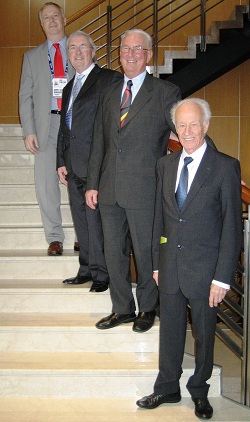18 November 2012
Five decades of WorldSkills expertise honoured
 By Michelle Bussey, WorldSkills International
By Michelle Bussey, WorldSkills International
As part of WorldSkills Americas 2012, Brazil invited the Chairs of the WorldSkills Technical Committee from the last five decades to share in the festivities and excitement.
René Gonthier from Switzerland was Chair of the Technical Committee from 1979-1985. René’s greatest legacy was identifying the problem that marks from all the skills could not be compared across the board and from Expert to Expert within each skill. There needed to be a system for making their scoring behaviour more transparent. In 1984 upon René's request, Cees Beuk developed the 500 point marking system and the computer program that later became the Competition Information System or CIS. This system was successfully trialed in 1985.
Zae Zung Kim from South Korea was Chair from 1985-1995. Kim was a very pleasant 'human relations' person, a friend but also a perfectionist. He used his competencis to keep the working standards of Experts and Technical Delegates at a high level. He would also challenge the Competition organizers to do the same. Cees Beuk, who was the Vice Chair of the Technical Committee at this time, developed the new CIS system which became effective in 1988 (when the WorldSkills Competition was held in Sydney, Australia) at which time the 'Best of the Competition Award' (named The Albert Vidal Award in honour of WorldSkills's first Secretary General) was introduced for the first time. The Albert Vidal Award was given its name by former WorldSkills President Tjerk Dusseldorp, after the WorldSkills Competition 1985 that was held in Osaka, Japan.
Franz Schropp from Germany was Chair from 1995-2003. When asked about his most memorable moments he talks about all the friends and connections he has made around the world over twenty years of Competitions. There is one special experience that has been with him for over 30 years. In 1978 the WorldSkills Competition was held in Busan, South Korea, with just 285 participants. He could not understand or read Korean, not even the numbers! So he had an interpreter, a Korean student who studied the German language and culture at the University of Busan. He spoke some German, initiated Franz into the mysteries of the Korean culture and stood by Franz day and night to assist him as an Expert. This student, who is now a successful professor of German language and culture at the University of Busan, is still in touch with him. A true friendship even after 34 years.
Liam Corcoran from Ireland was Chair from 2003-2011. Liam continued on the work of his predecessors ensuring that WorldSkills Competitions are at the forefront of skills development in the modern technological world. Liam introduced the Quality Management System in Seoul 2001 with the full support of his colleagues. This model is built on five pillars of the WorldSkills Organisation: Integrity, Fairness, Innovation, Partnership and Transparency. Every member of the Technical Committee became involved in furthering the development of improved competitions. From a Competitor’s perspective, mindful of the variety of languages and cultural differences, his goal was to create an ideal environment in which all Competitors were enabled to perform their best work. Experts began undergoing electronic tests to ensure that they have national or international competition experience and appropriate knowledge of WorldSkills Competition rules and procedures. No person could achieve these goals alone and Liam Corcoran expresses admiration for the enthusiasm, unstinting support and hard work shown by all his colleagues in the Technical committee and in what he calls ‘the WorldSkills family’.
John Shiel from Australia was Chair from 2011-2012. John gave outstanding contribution and commitment to the WorldSkills organisation over his 25 years of service including roles as an Expert, Chief Expert, Technical Delegate and finally as the Chair of the Technical Committee for this past year. John began the work needed to implement the action goals of the Vision 2020 that related to the skills competitions.
Stefan Praschl from Austria is the current Chair. Stefan has many years of experience as an Expert and Technical Delegate and is looking forward to the challenge of leading the Technical Committee towards a successful WorldSkills Competition in Leipzig, Germany in July, 2013 and working with his fellow Board members, Secretariat and Members to achieve our Vision 2020!